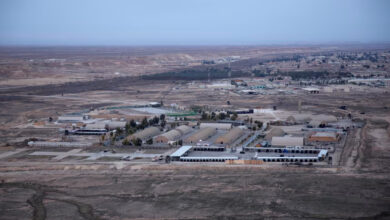Baghdad–A visit to Saudi Arabia by one of Iraq’s most prominent candidates in next month’s parliamentary election has sparked controversy among Iraqis suspicious of foreign interference in their affairs.
Rumors and accusations have swirled in Iraq since the 2003 US invasion about Iranian influence in Iraqi politics, Syrian harboring of Saddam Hussein loyalists and Saudi funding of Islamist insurgent groups.
The visit by Shia Iyad Allawi, a former prime minister and head of the secular Iraqiya list, to Sunni Saudi Arabia on Saturday has reinforced some Iraqis’ fears that foreign powers will use Iraq as an arena to settle sectarian scores.
Some Saudi clerics have backed Iraq’s Sunni insurgency, and wealthy Saudis are suspected of funding militants. Saudi King Abdullah has refused to meet Iraqi Prime Minister Nuri al-Maliki in recent years, and there is still no Saudi embassy in Baghdad.
Allawi’s well-publicized trip to the kingdom, where he met King Abdullah and the Saudi intelligence chief, so close to the March 7 ballot has raised eyebrows, especially as Saudi has had little publicized contact with Iraqi politicians since 2003.
"It did raise a lot of questions … especially as the meeting was attended by the (Saudi) head of intelligence," said a senior Iraqi diplomat familiar with Saudi relations.
Saudi Arabia, which adheres to a strict brand of Sunni Islam and is arguably the region’s most influential Sunni state, has clearly shown displeasure at the rise of a Shia-led government in Iraq after the ousting of Sunni dictator Saddam.
Allawi said the trip had nothing to do with the poll next month, and that it was about improving Iraq’s regional ties.
"The fuss was manufactured by some ruling parties," he said at a news conference, adding that "sick minds" were trying to divorce Iraq from its Arab neighbors.
Iran, another of Iraq’s neighbors, is non-Arab and Shia, and is close to Iraq’s ruling Shia parties.
Allawi’s Iraqiya list, which includes Vice President Tareq al-Hashemi, a Sunni, is expected to pose a strong challenge to Iraq’s established Shia Islamist parties next month.
Many skeptical Iraqis expect some degree of foreign interference in the election.
"Iraq is a treasure and everyone is wrestling to get the largest share of this treasure. Iraqi politicians are puppets of regional states," said Baghdad merchant Salam al-Fukeki.
Others, mostly Sunni Arabs, saw the visit as positive. For those that see Iran as far too close to Iraqi leaders, of whom many visit Tehran regularly, attempts to strike a balance through better ties with the rest of the Arab world are welcome.
"What’s the problem if Allawi visits Saudi Arabia? It’ll benefit us more than the prime minister visiting Iran again. At least Allawi is secular," said civil servant Ahmed Naji.
Hashemi, Iraqiya’s other big election draw card, is due to visit Syria, Jordan and Egypt, all Sunni states, in the coming days to meet leaders and woo Iraqi voters abroad, of whom Sunnis consider themselves the majority.
The trip, however, is not seen as controversial as Allawi’s given Hashemi’s Sunni background and senior government position, which often involves meeting regional leaders.
Some Iraqis point out that other politicians are highly likely to also seek support from abroad, but do so secretly.
"I know the timing of (Allawi’s) visit raises questions, but … all other parties are looking for foreign support, and they’re all working behind the curtains. So why criticize Allawi for doing this publicly?" said aid worker Esmaa Mahmoud.




